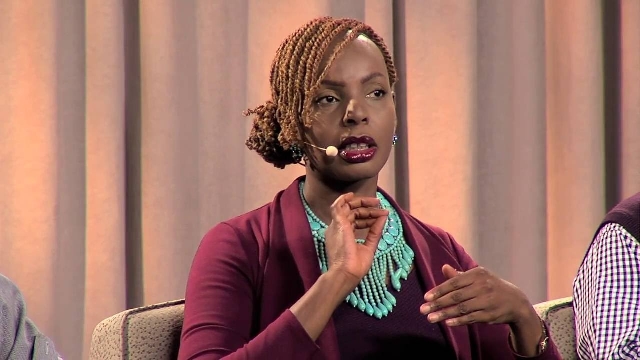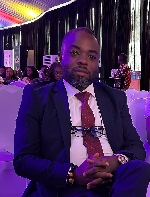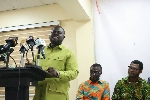Sex for grades: The Silence, The Story, The Struggle
 Esther Armah
Esther Armah
Sex for Grades. It is much more than a documentary. It is an opening to a well-known, not-so secret reality that is not unique to the University of Ghana. We can connect the dots from universities down to primary schools. We don’t, but we should. Those dots feature abusers of power and men who turn places of education into a playground for predators. Those dots also feature girls and women who have been silenced, stigmatized and shamed.
Our reactions, responses and courses of action are painfully familiar. Our surprise is hypocrisy. We treat this as an individual issue. We do not treat it as an institutional one, and even more crucially as one that is sector-wide.
It is beyond time that we do.
University of Ghana has suspended the two Professors at the centre of the allegations.
Before the suspension, this alleged perpetrator got a podium, a platform, a mic and an audience enabling him to do what alleged predators have done since the beginning of time, defend, excuse, attack, dismiss, repeat. As the predator mounted the podium, social media fired up its own mix of hash tag horror; labelling, calling out, accusing those who had made the allegations.
There are bigger issues, harder questions and a different approach we can take.
What is the institutional process for dealing with allegations of sexual abuse, harassments and inappropriateness? The sordid truth is it is rarely one instance even when it is one perpetrator. Usually it is because one person spoke up or spoke out, but so many more were silent. The line of allegations is often long, the perpetrators emboldened by lack of penalty or punishment.
The above is the story we live, relive and recycle
The BBC Africa Eye documentary did not make startling revelations. No.. This issue is one that rears its ugly head again and again.
It is our failure to name what we know. It is our insistence on dealing with sexual abuse and harassment by repeatedly telling young women to be more emboldened to report. The truth is women speak out and up. They always have. That is usually how we get to know about a professor predator and those he is victimizing. And society – the institution, their peers, sometimes their families – call them liars. There is intimidation, victimization and retribution. And then under such circumstances, we sound the drum, telling young women that they alone must continue to do this work of reporting.
The above is the story that we live, relive and one that reoccurs.It is the hypocrisy of ignoring how power works in such cases. There is the considerable power an institution wields in support of a man in power, how that power is used to punish the one who spoke up and in so doing, alerts other survivors to their possible fate if they also choose to speak up. So many stay silent. They learn the same fate awaits them. It is this structural power we need to engage more effectively.
The above is part of the struggle we face as institutions and as a sector.
I write this both personally, professionally. I write this about progress, people and power.
I say personal, because I am a Media Communications Lecturer. When I came home to Ghana, my first journalism job was teaching in a university. I no longer teach there. I can honestly say I had no idea of the extent to which sexual harassment, sexual abuse, sex for grades, the expectation of sex, was an issue.
Two things happened that alerted me.
My students call me Ms. E. I am a tough lecturer, a journalist who loves my profession and believes media is a power that must be understood and used wisely; and that journalism is a skill that must be learned and then worked on continuously to improve, evolve and grow.
I created a student radio show with multiple segments, encouraging my students to learn the varying skillsets of strong broadcast journalism; from research and pre-production to hosting and post-production. Students had to hold editorial meetings and come up with ideas. One by one the young women students came to me, voicing concern about sexual harassment. It was not a small group. I became so concerned, I asked them if they were referring to a particular lecturer. They refused to say. I spoke with fellow Lecturers. Some told me this is just ‘normal’. I shouldn’t worry. I asked for a meeting with my fellow faculty and brought up the issue. My concern was not taken seriously. I asked about our institution’s policy on sexual harassment. Like many other institutions, we had the usual ‘zero tolerance for sexual harassment’. That line did not manifest in practice. I wanted something more concrete to share with my students. I didn’t think individual assurances, and them feeling safe with me was enough.
I remember that meeting. Specifically, that the issue was not taken seriously – by either the men or the women. I remember the immediate blaming and the ‘some of these girls dier’. The discussion centred individual girls and their behaviour. There was a refusal to deal with it as an abuse of power by men, or as an institution. This was despite the fact the institution had recently dealt with a sex for grades scandal, that ended with the firing of lecturers.
We as faculty, as an institution and as a sector are part of the issue. We treat what is institutional as individual. We trivialize what is sector-wide. This particular hypocrisy must end in order for there to be real change.
This too is our struggle.
I have also learned that teachers who stand up and support students who are making allegations of sexual abuse and harassment against, for example, headteachers also face victimization and retribution. I got involved actively in the issue of schools, sex and safety precisely because of what I learned and the toll it was taking on the lives of students, the quality of our education and the impact of our institutions. Working with a SHS on a case of sexual abuse, I listened as the teacher – who did what any good teacher does – protect his students and advocate for action against a sexua abuser – was singled out, penalized and stigmatized because of his advocacy.
These behaviours incentivize silencing. They turn teachers into complicit bystanders protecting their jobs and their futures, and not their students.
The dots on a pipeline of sexual harassment from university down to primary school are an education for girls and boys. It teaches girls their bodies are currency, that they must expect and put up with the advances, harassment and abuse of men in power and authority. Just as importantly, it teaches boys – who become young men – that their power can also come in how they deal with girls and women’s bodies. They can take what they want without consequence or consent, and be rewarded for it. Girls learn to navigate the rocky terrain of constant harassment. Boys learn to abuse their power and that they have a right to girls and women’s bodies.
None of these lessons should feature in our education system.
With the disgrace of this scandal and the scrutiny of a global spotlight, the University of Ghana has an opportunity to set an example as a tertiary institution when it comes to sexual abuse.
An unimplemented policy is like having no policy at all. Girls are losing access to education because we privilege the reputation and future of alleged predators, while we punish the girl or girls who speak up. We do this. We know this. It is not new. It is not news.
And yet here we are again.
We have successfully built a system that shields the guilty, rewards the predator, sanctions the survivor and stigmatizes the vulnerable.
At what point do we stop ringing our hands and saying how shocked we are and get on with the very real and necessary business of creating sector-wide, young people centered policy for sexual harassment, with real time sanctions and serious penalties for alleged perpetrators?
In the back and forth, the haranguing and accusing, the shaming and the blaming, the perpetrator grandstanding – what gets lost, silenced and swallowed is the cost, the consequence of abuse, and the legacy of often untreated trauma for the survivors.
And that is the real tragedy.
Source: Esther A. Armah






